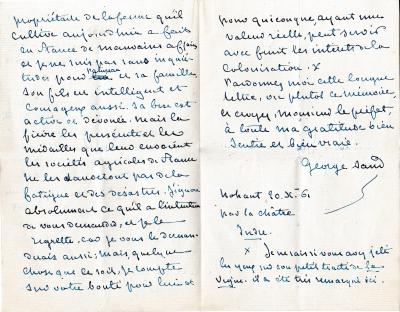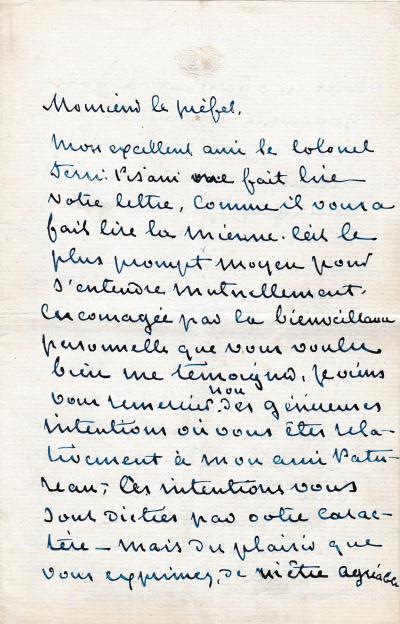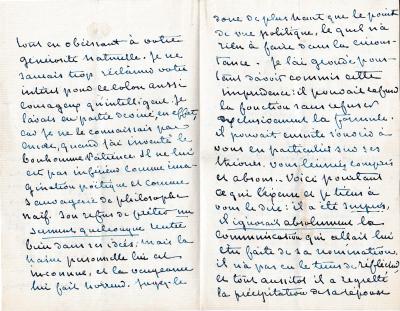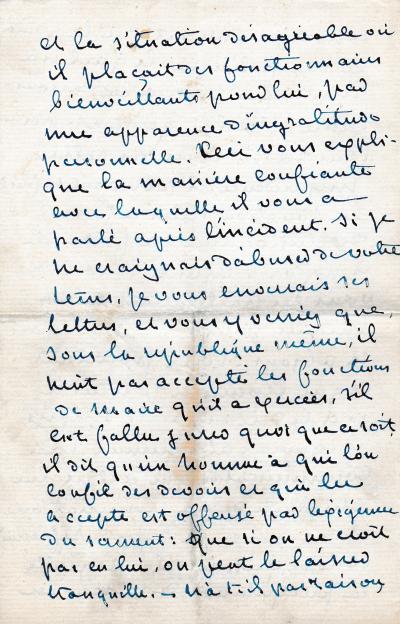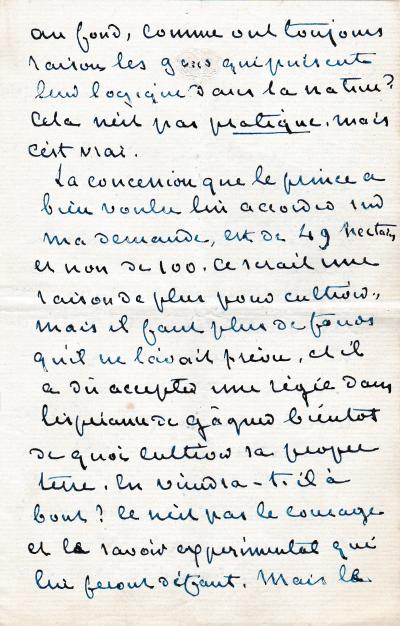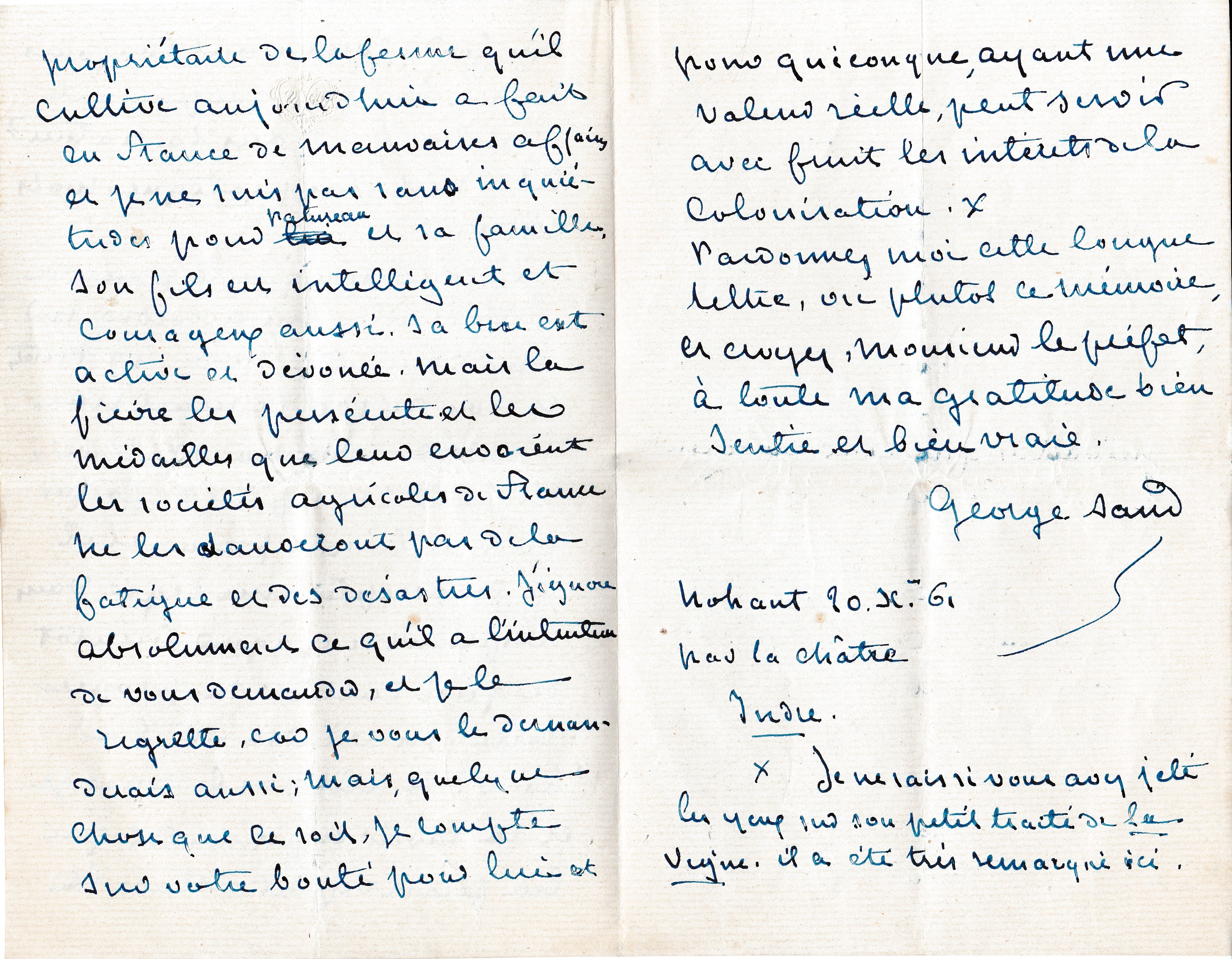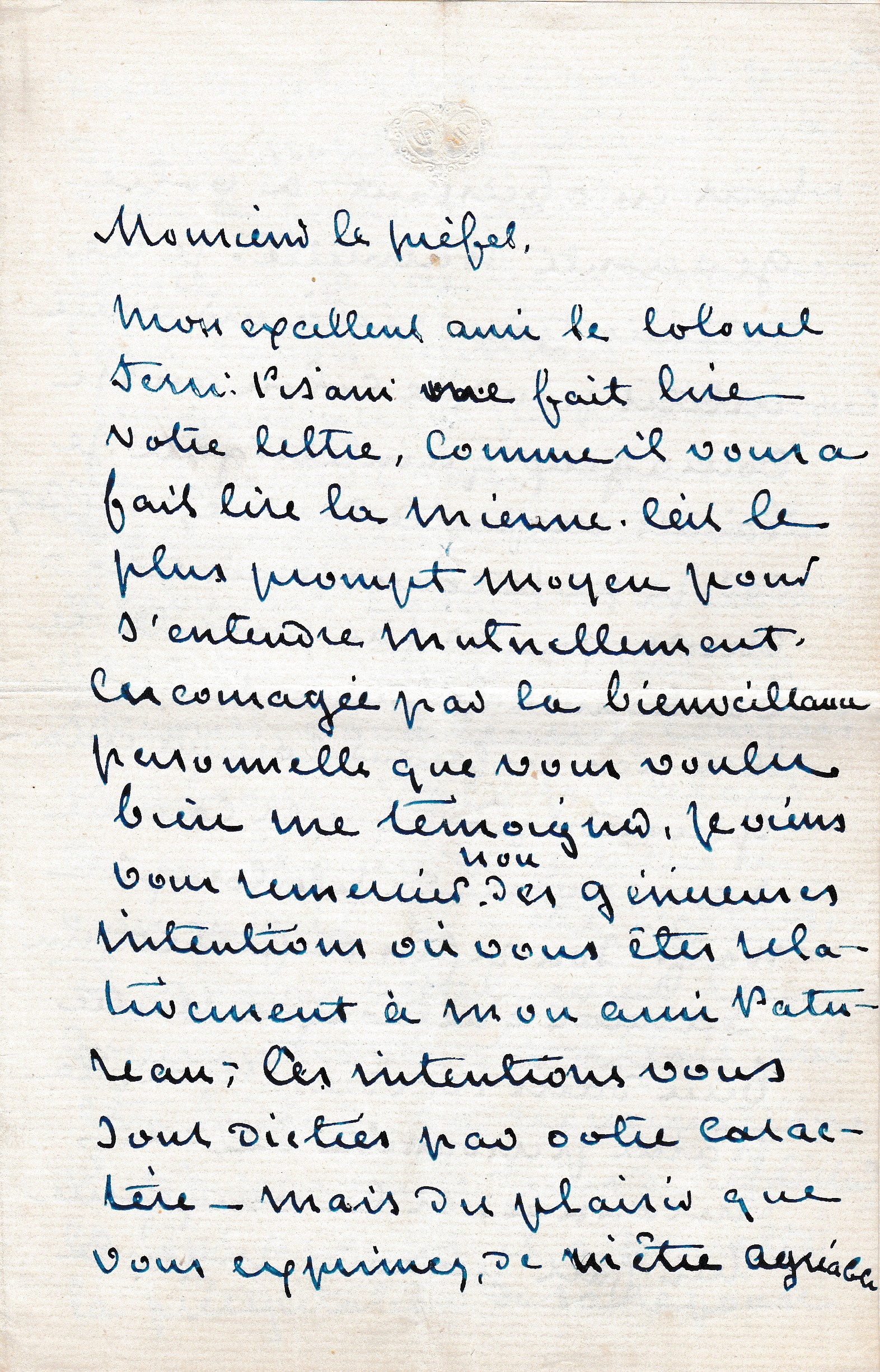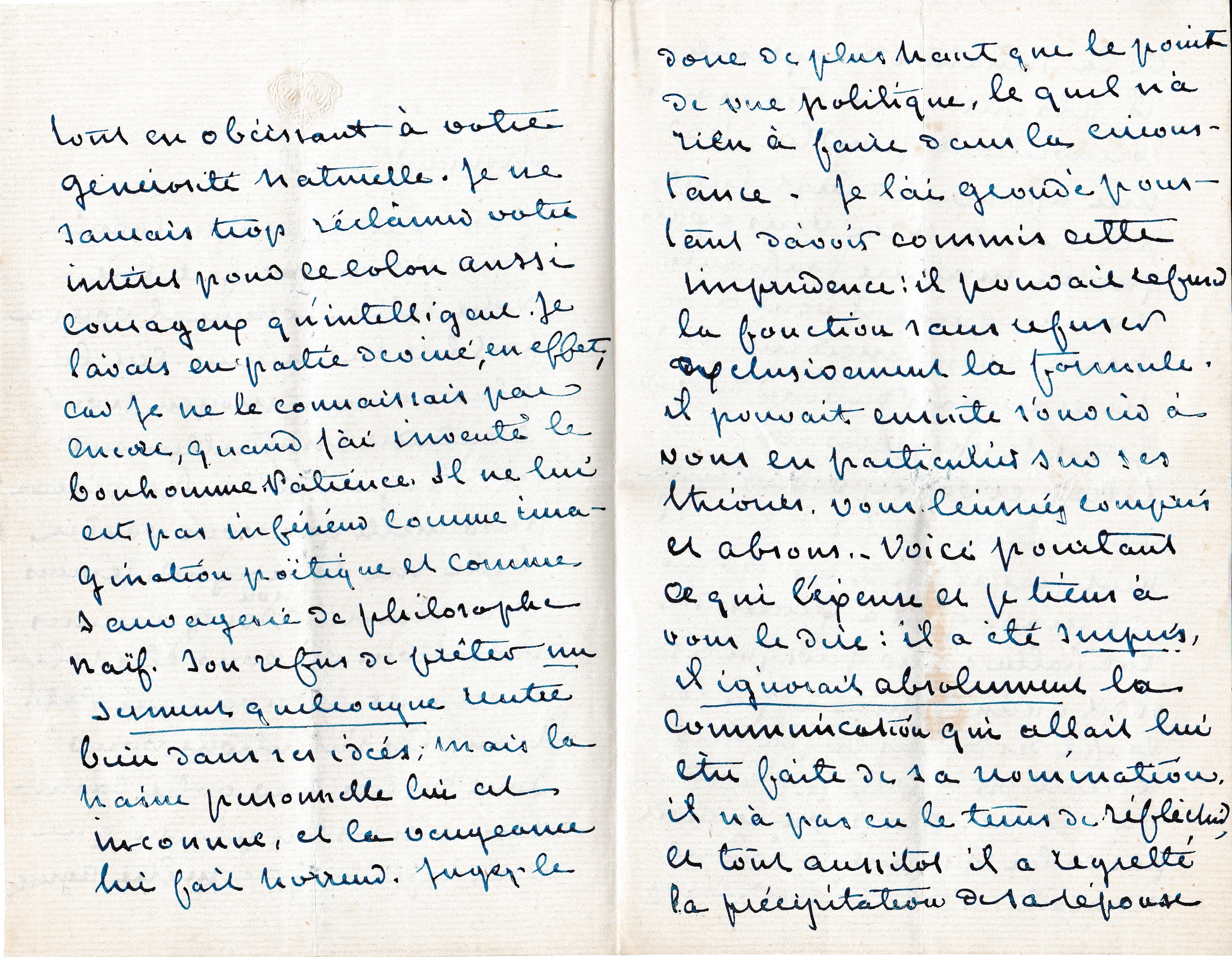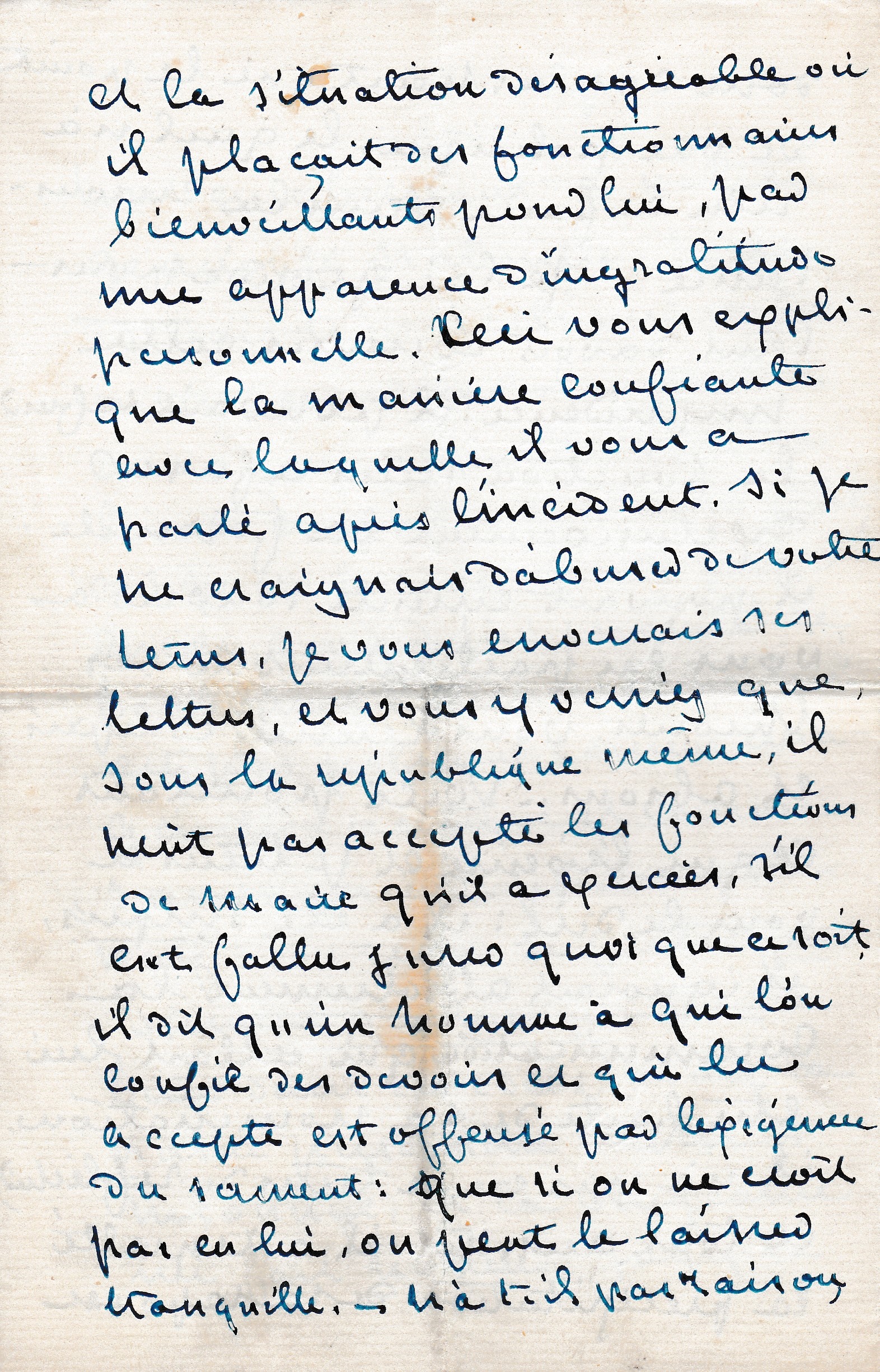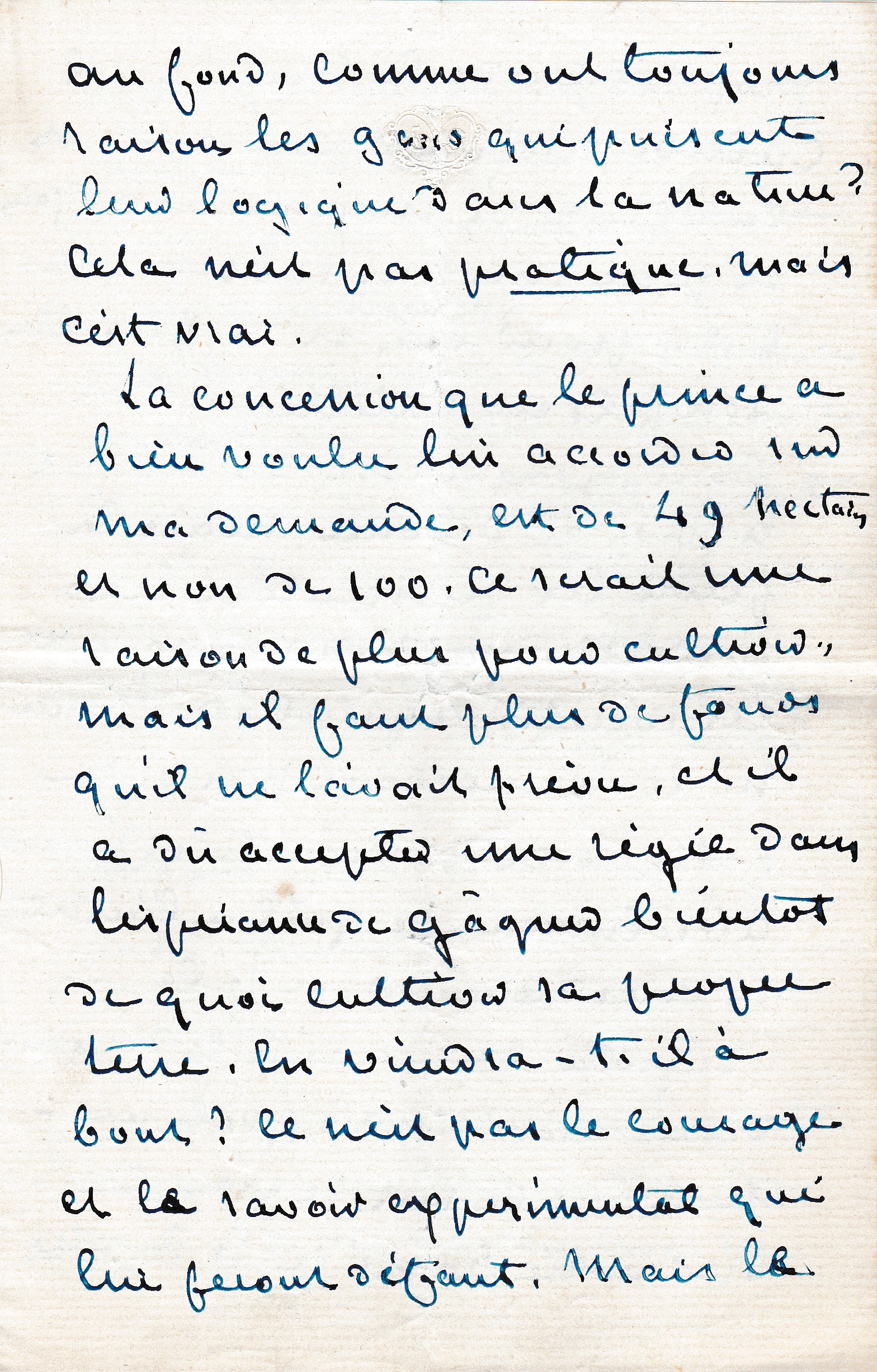George SAND - Autograph signed letter 7 pages
George SAND (1804 - 1876)
Long autograph letter signed to the prefect of Constantine Fortuné Lapaine. Nohant, December 20, 1861; 7 pages in-8 °.
Letter of support to his friend Patureau whom George Sand compares to one of his characters from a novel, Patience, the philosopher who dares to brave the fear of the Mauprats: "My excellent friend Colonel Ferri Pisani makes me read your letter, as he did to you. read mine. It is the quickest way to get along with each other, encouraged by the personal kindness you kindly show me. I come to thank you, no, for the generous intentions you have shown in relation to my friend Patureau; These intentions are dictated to you by your character - but from the pleasure you express, from pleasing me while obeying your natural generosity. I cannot claim enough your interest in this brave and intelligent settler. I had partly guessed, in fact, because I did not know him yet, when I invented the good man Patience [Mauprat novel published in 1837]. He is not inferior to him as a poetic imagination and as the savagery of a naive philosopher. His refusal to take any oath fits well in his ideas, but personal hatred is unknown to him, and revenge horrifies him. So judge it higher than the political point of view, which has nothing to do in the circumstances. I scolded him, however, for having committed this imprudence: he could refuse the post without exclusively refusing the formula. He could then open up to you specifically about his theories. You would have understood it and absolved it. Yet here is what excuses him and I want to tell you: he was surprised, he was absolutely unaware of the communication that was going to be made to him of his appointment. He did not have time to think, and immediately he regretted the haste of his response and the unpleasant situation in which he placed officials who were benevolent for him, by an appearance of personal ingratitude. This explains to you the confident manner in which he spoke to you after the incident. If I were not afraid of taking advantage of your time, I would send you his letters, and you would see there that under the republic itself, he was not accepted the functions of mayor that he exercised, if it had been necessary to swear what whether it is he says that a man who is entrusted with duties and who accepts them is offended by the requirement of the oath: that if one does not believe in him, one can leave him alone. - isn't he basically right, as people who draw their logic from nature are always right? It is not practical, but it is true. The concession that the prince [prince Jérôme Bonaparte] kindly granted him at my request is 49 hectares and not 100. That would be one more reason to cultivate, but more funds are needed than he is. had planned, and he said he accepted a management in the hope of soon earning enough to cultivate his own land. Will he overcome it? It is not courage and experimental knowledge that will fail him. But the owner of the farm he cultivates today did some bad business in France and I am not without concern for Patureau and his family. Her son is smart and brave too. Her daughter-in-law is active and devoted. But the fever persecutes them and the medals sent to them by the agricultural societies of France will not save them from fatigue and disasters. I have no idea what he intends to ask you, and I regret it, because I would ask you too, but whatever it is, I count on your kindness to him and to anyone of real value. , could fruitfully serve the interests of colonization. Forgive me this long letter, or rather this memoir (…) I do not know if you have cast your eyes on his little treatise on the vine [Culture of the vine. Simple advice from a winegrower to his colleagues in Algeria, Paris, 1861]. He was very noticed here. "
Letter referenced in the Correspondance Lubin, volume XVI, p.676-678
She is proud of her friend Patureau whom she compares to Patience, the only man who dares to brave the Mauprats, a family of a cruel lord. He is a self-taught philosopher who passes for a sorcerer and lives in a ruined tower. Mauprat was published in 1837, it is a philosophical tale against the backdrop of the French revolution.
Long autograph letter signed to the prefect of Constantine Fortuné Lapaine. Nohant, December 20, 1861; 7 pages in-8 °.
Letter of support to his friend Patureau whom George Sand compares to one of his characters from a novel, Patience, the philosopher who dares to brave the fear of the Mauprats: "My excellent friend Colonel Ferri Pisani makes me read your letter, as he did to you. read mine. It is the quickest way to get along with each other, encouraged by the personal kindness you kindly show me. I come to thank you, no, for the generous intentions you have shown in relation to my friend Patureau; These intentions are dictated to you by your character - but from the pleasure you express, from pleasing me while obeying your natural generosity. I cannot claim enough your interest in this brave and intelligent settler. I had partly guessed, in fact, because I did not know him yet, when I invented the good man Patience [Mauprat novel published in 1837]. He is not inferior to him as a poetic imagination and as the savagery of a naive philosopher. His refusal to take any oath fits well in his ideas, but personal hatred is unknown to him, and revenge horrifies him. So judge it higher than the political point of view, which has nothing to do in the circumstances. I scolded him, however, for having committed this imprudence: he could refuse the post without exclusively refusing the formula. He could then open up to you specifically about his theories. You would have understood it and absolved it. Yet here is what excuses him and I want to tell you: he was surprised, he was absolutely unaware of the communication that was going to be made to him of his appointment. He did not have time to think, and immediately he regretted the haste of his response and the unpleasant situation in which he placed officials who were benevolent for him, by an appearance of personal ingratitude. This explains to you the confident manner in which he spoke to you after the incident. If I were not afraid of taking advantage of your time, I would send you his letters, and you would see there that under the republic itself, he was not accepted the functions of mayor that he exercised, if it had been necessary to swear what whether it is he says that a man who is entrusted with duties and who accepts them is offended by the requirement of the oath: that if one does not believe in him, one can leave him alone. - isn't he basically right, as people who draw their logic from nature are always right? It is not practical, but it is true. The concession that the prince [prince Jérôme Bonaparte] kindly granted him at my request is 49 hectares and not 100. That would be one more reason to cultivate, but more funds are needed than he is. had planned, and he said he accepted a management in the hope of soon earning enough to cultivate his own land. Will he overcome it? It is not courage and experimental knowledge that will fail him. But the owner of the farm he cultivates today did some bad business in France and I am not without concern for Patureau and his family. Her son is smart and brave too. Her daughter-in-law is active and devoted. But the fever persecutes them and the medals sent to them by the agricultural societies of France will not save them from fatigue and disasters. I have no idea what he intends to ask you, and I regret it, because I would ask you too, but whatever it is, I count on your kindness to him and to anyone of real value. , could fruitfully serve the interests of colonization. Forgive me this long letter, or rather this memoir (…) I do not know if you have cast your eyes on his little treatise on the vine [Culture of the vine. Simple advice from a winegrower to his colleagues in Algeria, Paris, 1861]. He was very noticed here. "
Letter referenced in the Correspondance Lubin, volume XVI, p.676-678
She is proud of her friend Patureau whom she compares to Patience, the only man who dares to brave the Mauprats, a family of a cruel lord. He is a self-taught philosopher who passes for a sorcerer and lives in a ruined tower. Mauprat was published in 1837, it is a philosophical tale against the backdrop of the French revolution.
This description has been translated automatically. please click here Click here to display the original language FR
Sold
This item is not available. Please click on « View the catalog » to see similar items available.
Delivery France:
30.00 € incl. VAT (*)
Country prices, click on See
See more
Hotline
Please contact us for any question regarding this object. For any other inquiry, we invite you to fill the contact form.
Other items from the category « Autographs »
